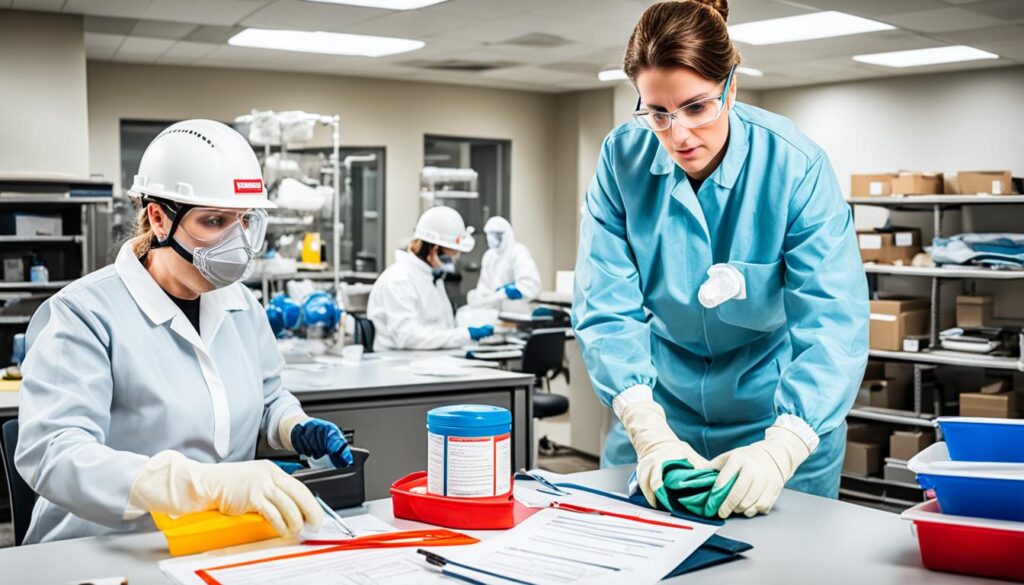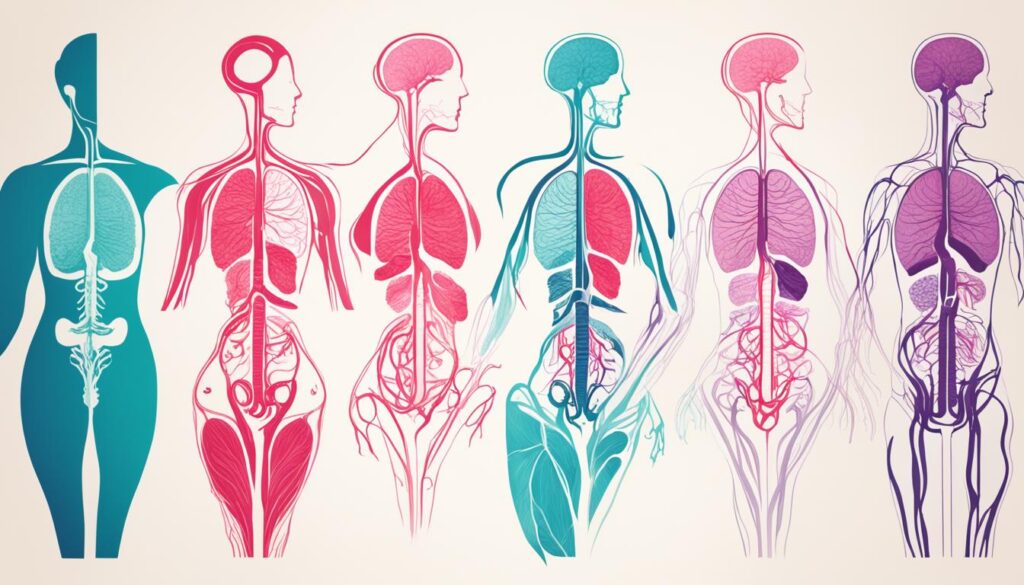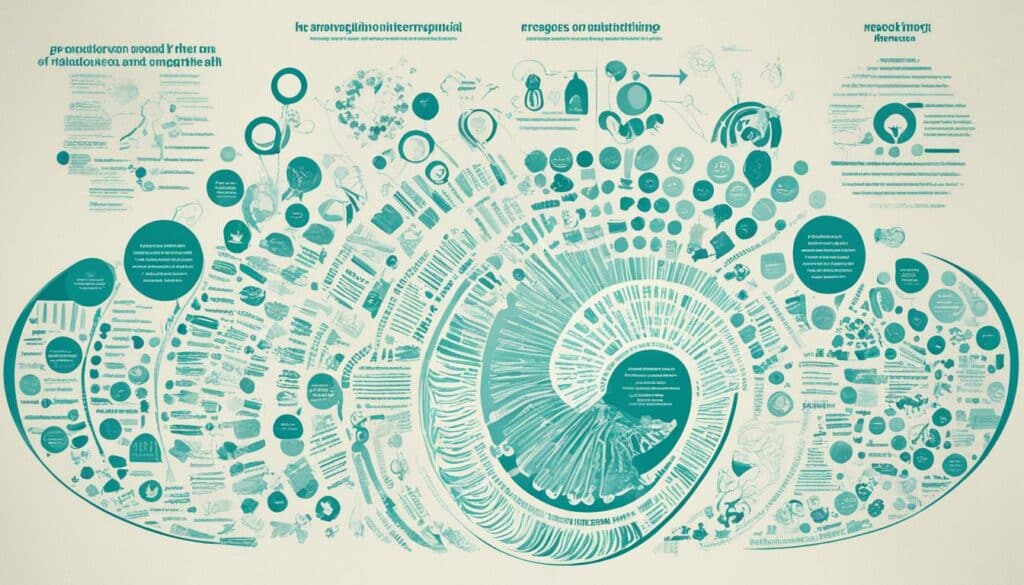Reproductive health is about the well-being of the male and female systems from birth to old age. It involves the health of reproductive organs like ovaries and testicles. It also covers the role of different hormones, especially those produced by the pituitary gland.
Problems in reproductive health can affect both sexes. These problems include difficulty in having children, irregular periods, and imbalances in hormone levels. The National Institute of Environmental Health Sciences (NIEHS) is working hard to understand how our environment can hurt our reproductive health.
Key Takeaways : Reproductive Health
- Reproductive health encompasses the wellbeing of the female and male reproductive systems.
- Reproductive health disorders can affect both women and men, including infertility, menstrual problems, and hormonal imbalances.
- NIEHS researches how environmental factors impact reproductive health for all genders.
- Proper functioning of reproductive organs and hormones is crucial for overall reproductive wellbeing.
- Understanding the complex interplay between the environment, biology, and reproductive health is a key focus of research.
Understanding Reproductive Health
Reproductive health is about keeping the male and female bodies working well. This happens through life, focusing on how hormone glands like the pituitary work. It also looks at the health of organs such as ovaries and testicles.
Definition of Reproductive Health
It’s about the physical, mental, and social well-being of our bodies for reproduction. This term covers having a good sex life, the ability to have kids, and the choice on timing. Keeping it in good shape lets everyone enjoy intimacy and plan their family, as they want.
Importance of Reproductive Health for Both Genders
Good reproductive health matters for men and women. It affects having kids, being intimate, periods, and how we feel overall. It involves learning about reproductive health, making family plans, preparing for pregnancy, support for mothers, and help for fertility issues.
Impact of Environmental Factors

The National Institute of Environmental Health Sciences (NIEHS) found that environmental factors really affect our reproductive health. Things like a mother’s heat exposure during pregnancy and air pollution can change fertility, pregnancy outcomes, and even lead to reproductive disorders.
Heat Exposure During Pregnancy
Being in the heat a lot when you’re pregnant can be dangerous. It increases the risk of severe health issues for the mother. When it’s very hot, especially during key times in pregnancy, it can harm both the mother and baby.
Air Pollution and Pregnancy Complications
Air pollution, especially from cars and trucks (PM2.5), makes problems like pregnancy hypertension more likely. This highlights the urgent need to improve air quality for the sake of reproductive health.
Chemical Exposure and Fertility
Certain chemicals, like those in flame retardants and plastic, are bad for fertility and IVF success. They can mess with our hormones and harm our reproductive cells’ health and number. This lowers the chances of getting pregnant.
Knowledge of how our environment impacts reproductive health helps researchers and doctors. They can create better ways to prevent and treat problems. This way, everyone can better meet their reproductive aspirations and stay healthy.
Occupational Factors Affecting Fertility

Some jobs can make it hard for women to have kids. For example, women who lift heavy things or work different shifts might have less chance of getting pregnant. This happens because they tend to have fewer eggs in their ovaries. Thus, their fertility is lower and it’s harder for them to get pregnant, even with help from IVF. It’s important to know that these job factors could affect a woman’s reproductive health.
Heavy Lifting and Shift Work for Women
It is shown that certain jobs can impact the number of eggs a woman has. For instance, if a woman lifts heavy things at work or her job shifts change a lot, she might not have many eggs left. This means her chances of getting pregnant are lower. And if she tries IVF, it may not work out as well.
Reproductive Health

Reproductive health problems affect both women and men. They can harm overall health and life quality. Knowing about the troubles each gender faces helps in giving better care and support.
Female Reproductive Health Issues
Women often face issues like irregular periods, heavy bleeding, and severe cramps. They might also deal with infertility and PCOS, which make getting pregnant harder. Endometriosis and uterine fibroids are common and cause pain. Hormonal imbalances can also cause health problems.
Male Reproductive Health Issues
Men may experience impotence, erectile dysfunction, or have low sperm count. These problems affect sexual function and the ability to have children. It’s important to keep the prostate healthy for overall reproductive health.
It’s vital to teach about sexual and reproductive health to everyone. This knowledge helps individuals take care of their health better. They can make wise choices for their sexual and reproductive well-being.
Effects of Infant Feeding on Future Reproductive Health
New research shows a troubling connection between the formula a baby drinks and future health. It seems that girls who drank soy formula face more issues later. These include heavy periods, severe period pain, endometriosis, and bigger uterine fibroids than those who didn’t have soy formula.
Soy Formula and Menstrual Problems
Girls who had soy formula early in life are more likely to have severe period cramps and heavy bleeding. We’re not entirely sure why this happens. It might be that soy formula somehow messes with their hormones during important stages of growth.
Soy Formula and Endometriosis Risk
Endometriosis has also been connected to soy formula in infancy. This condition causes a lot of pain. Experts think the isoflavones in soy might throw off the natural hormonal balance. This might make someone more likely to get endometriosis later.
Soy Formula and Uterine Fibroids
Girls who drink soy formula might also have bigger uterine fibroids when they grow up. These are non-cancerous growths in the uterus. We’re still learning how soy formula might lead to this. Hormonal changes caused by soy could play a part.
These discoveries highlight the lasting influence of early feeding choices on health. It shows the importance of picking infant formula wisely. As insight into this field grows, it’s crucial for both healthcare experts and parents to stay informed.
Vitamins and Reproductive Health

Essential vitamins and minerals are key for good reproductive health. Vitamin D is especially important. It has been at the center of many studies in this field.
Vitamin D and Uterine Fibroids
Vitamin D levels are linked to uterine fibroid growths. Women with enough vitamin D are less likely to get these fibroids. This shows how vital vitamin D is for reproductive health.
Getting the right amount of vitamin D can be through food, supplements, or sunlight. This can lower the risk of uterine fibroids. It highlights the big role nutritional factors play in reproductive health.
Chemical Exposure and Assisted Reproductive Technology

Some environmental chemicals can harm the success of assisted reproductive technologies, like in vitro fertilization (IVF). Women with more flame retardants and plasticizers in their urine had fewer ovarian follicles. They also had less success and lower birth rates with IVF.
Flame Retardants and Plasticizers Impact on IVF
Chemicals such as flame retardants and plasticizers can throw off the body’s delicate balance. This disruption can lead to fewer eggs maturing properly, causing problems with fertility. So, these contaminants can hurt IVF success.
Phthalates and Male Fertility in IVF
Chemical exposure impacts men’s fertility too. Higher amounts of urinary phthalate metabolites in men lead to lower-quality embryos during IVF. This shows that environmental chemical exposures can affect both male and female fertility. It can hurt the results of assisted reproductive technology treatments.
| Chemical Exposure | Impact on IVF |
|---|---|
| Flame retardants and plasticizers | Lower numbers of ovarian follicles, fewer successful pregnancies, and lower live birth rates in women |
| Phthalates | Lower-quality embryos produced in men |
Involving Men in Reproductive Health

In the past, health services focused mainly on women. Now, we see how vital it is to include men. Men, when educated and involved, can support their partners’ choices better. This means they might help more with family planning and use of contraceptives. They can also make pregnancy outcomes better. Men who know about pregnancy can support their partners more effectively. They help ensure women get the care they need on time.
Benefits of Male Involvement
Getting men involved benefits everyone. Teaching them about sexual health and preconception health helps them take better care of themselves and support their partners. Plus, it means they understand the importance of prenatal care and emergency services if problems come up.
Strategies for Engaging Men
To involve men, we can add their own services to existing programs. We should also reach out to men in places where they gather. Additionally, training health workers to treat everyone fairly is crucial. This way, reproductive health services become more relevant and welcoming to all.
Research on Reproductive Health

The NIEHS works hard to understand how things in our environment might affect our ability to have children. They look at how chemicals, pollution in the air, and our jobs can influence our ability to get pregnant, have healthy babies, and avoid problems like fibroids.
NIEHS Studies on Reproductive Health
The NIEHS supports several important projects like the EARTH study and the PACE consortium. They look at how what we’re exposed to early in life might change our ability to have kids and affect our development. This work helps us learn more about how our surroundings affect our health.
Consortium Studies on Environmental Exposures
NIEHS-funded projects with experts from many fields are studying epigenetics’ role in reproductive health. They aim to understand how environmental factors might impact fertility and pregnancy through epigenetics. This knowledge will help protect and enhance the reproductive health of everyone.
Also Read : 10 Simple Strategies To Improve Your Mental Health & Wellbeing
Conclusion
Maintaining good reproductive health is very important. It affects both men and women of all ages. Environmental factors like chemicals, pollution, and work conditions influence our ability to have children and the health of pregnancies. We need to deal with these environmental issues and get men more involved in reproductive health care. This is key in making sure everyone’s reproductive health stays well.
Providing reproductive health services that are open to everyone is crucial. So is giving out lots of health education. Ongoing research is also needed. This work helps us understand how to best meet the reproductive health needs of the public. A complete, gender-inclusive approach to reproductive health helps all people learn and control their reproductive health. This leads to better results for individuals, their families, and communities.
We’re learning more about how the environment, biology, and reproductive health are connected. It’s important to use this knowledge to create better plans. These plans should help with fertility, pregnancy health, and stopping reproductive issues. By working together and pushing our understanding of reproductive health, we strive for a future. In this future, everyone has the help and resources they need for top-notch reproductive health in their lives.
FAQs
What is reproductive health?
Reproductive health is very important for everyone. It looks at the health of our bodies when it comes to having children. This includes how our ovaries and testicles work and the hormones that help them work properly.
Why is reproductive health important for both men and women?
It’s key to keeping people healthy and able to have kids. If there are problems, not only fertility but also sex, periods, and health can suffer. Knowing about and helping these issues is vital for everyone.
How can environmental factors impact reproductive health?
The world around us can affect how well our bodies can have babies. This can happen from heat, dirty air, and chemicals. These things can mess with our hormones and make it harder to get pregnant. They can also cause problems during pregnancy.
What occupational factors can affect fertility?
Certain jobs can make it harder for women to have kids. For example, carrying heavy things or working at night could be risky. This might mean they have less chance of getting pregnant, also when trying in clinics.
What are some common reproductive health issues for women and men?
Women may face issues with their periods, getting pregnant, or problems like PCOS or endometriosis. Men could have fertility or sexual problems. These problems are quite normal but should be taken seriously by a doctor.
How can infant feeding impact future reproductive health?
The milk babies drink might affect them later. For instance, girls given soy milk might have bigger period problems or issues with pregnancy. It’s not common, but it’s something to be aware of.
What is the role of vitamins in reproductive health?
Getting enough vitamin D could help women avoid some issues. It seems to help protect against certain problems in the uterus. This is why taking care of vitamins is important for health.
How can chemical exposures impact assisted reproductive technologies?
Chemicals in our environment may make it harder for some treatments to work. They can lower how many eggs women have, how well pregnancies go, and the health of the baby. Men’s chemicals might also make their part in having babies less likely to succeed.
Why is it important to involve men in reproductive health efforts?
It’s not just a woman’s thing to take care of baby-making health. Men who understand this can help their partners avoid pregnancy if needed. They also help make sure everything goes well during pregnancy. Knowing about health helps the whole family.
What research is being conducted on reproductive health?
The NIEHS looks into how the world affects our ability to have kids. They study how chemicals, dirt in the air, and work can cause problems. By learning more, we can try to prevent these issues.
Source Links
- https://www.niehs.nih.gov/sites/default/files/health/materials/reproductive_health_in_females_and_males_508.pdf
- https://www.guttmacher.org/journals/ipsrh/1998/03/men-partners-reproductive-health-issues-action
- https://www.niehs.nih.gov/health/topics/conditions/repro-health








Leave A Comment